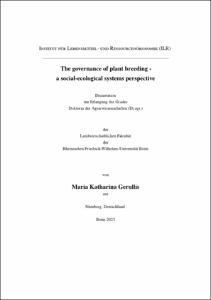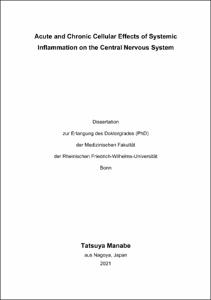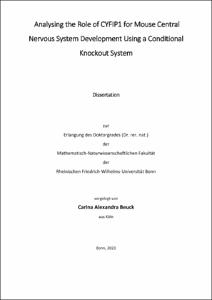Gerullis, Maria Katharina: The governance of plant breeding - a social-ecological systems perspective. - Bonn, 2023. - Dissertation, Rheinische Friedrich-Wilhelms-Universität Bonn.
Online-Ausgabe in bonndoc: https://nbn-resolving.org/urn:nbn:de:hbz:5-70514
Online-Ausgabe in bonndoc: https://nbn-resolving.org/urn:nbn:de:hbz:5-70514
@phdthesis{handle:20.500.11811/10766,
urn: https://nbn-resolving.org/urn:nbn:de:hbz:5-70514,
author = {{Maria Katharina Gerullis}},
title = {The governance of plant breeding - a social-ecological systems perspective},
school = {Rheinische Friedrich-Wilhelms-Universität Bonn},
year = 2023,
month = apr,
note = {Climate change and social conflicts put modern agricultural systems under pressure, necessitating systemic transformations of these systems towards sustainability. At the core of these sustainability challenges to agriculture lie the seed we use to produce plants giving us food, feed and fiber. To achieve high crop yields, farmers need varieties with the right combination of characteristics, called traits, which fit to the pedo-climatic conditions of their farms and to other preferences regarding product qualities. The route from developing a trait combination in a plant that such characteristics, however, is long and novel traits need to pass through a complex social-ecological system to reach the farm gate. Each chapter of this thesis engages with different organizing principles of social-ecological systems and what they mean for the governance of plant breeding within the seed systems. Seed systems entail all activities along the breeding and seed supply chain needed for creating (new) varieties for use on farms. These activities of plant breeding depend on sustained flows of genetic material within the seed and cropping system. The various activities are structured by rules, norms and strategies, also referred to as institutions (Ostrom 2005). Institutions need to be designed consciously to achieve sustainable outcomes. The aggregated processes of creating, maintaining, directing, recognizing, and enforcing institutions are the governance of the seed system. Overall the thesis inquires how to best govern seed systems towards more sustainable outcomes in seed and cropping systems. Hence, we first ask what the governance challenges are in providing and appropriating crop genetic diversity as the underlying resource. We found that provisioning symmetric and credible information between different actor groups will grant a smoothly running seed system. Second, we further unpack the activities around the nested adjacent action situations for social-ecological systems and provide a set of diagnostic questions to untangle the nested and multi-tiered variables of the resource system within mid to large-scale SESs. Third, we develop a governance heuristic showing that Genetics, Environment, Management and Social system (GxExMxS) are core elements, which need to be considered when governing plant breeding research under the premise of mission-oriented governance. Fourth, we ask the question whether pest shocks lead to a increase in multiplication area of resistant varieties. Using data from seed variety trials matched with data on seed multiplication area per variety. The no-effect hypothesis could not be refuted.},
url = {https://hdl.handle.net/20.500.11811/10766}
}
urn: https://nbn-resolving.org/urn:nbn:de:hbz:5-70514,
author = {{Maria Katharina Gerullis}},
title = {The governance of plant breeding - a social-ecological systems perspective},
school = {Rheinische Friedrich-Wilhelms-Universität Bonn},
year = 2023,
month = apr,
note = {Climate change and social conflicts put modern agricultural systems under pressure, necessitating systemic transformations of these systems towards sustainability. At the core of these sustainability challenges to agriculture lie the seed we use to produce plants giving us food, feed and fiber. To achieve high crop yields, farmers need varieties with the right combination of characteristics, called traits, which fit to the pedo-climatic conditions of their farms and to other preferences regarding product qualities. The route from developing a trait combination in a plant that such characteristics, however, is long and novel traits need to pass through a complex social-ecological system to reach the farm gate. Each chapter of this thesis engages with different organizing principles of social-ecological systems and what they mean for the governance of plant breeding within the seed systems. Seed systems entail all activities along the breeding and seed supply chain needed for creating (new) varieties for use on farms. These activities of plant breeding depend on sustained flows of genetic material within the seed and cropping system. The various activities are structured by rules, norms and strategies, also referred to as institutions (Ostrom 2005). Institutions need to be designed consciously to achieve sustainable outcomes. The aggregated processes of creating, maintaining, directing, recognizing, and enforcing institutions are the governance of the seed system. Overall the thesis inquires how to best govern seed systems towards more sustainable outcomes in seed and cropping systems. Hence, we first ask what the governance challenges are in providing and appropriating crop genetic diversity as the underlying resource. We found that provisioning symmetric and credible information between different actor groups will grant a smoothly running seed system. Second, we further unpack the activities around the nested adjacent action situations for social-ecological systems and provide a set of diagnostic questions to untangle the nested and multi-tiered variables of the resource system within mid to large-scale SESs. Third, we develop a governance heuristic showing that Genetics, Environment, Management and Social system (GxExMxS) are core elements, which need to be considered when governing plant breeding research under the premise of mission-oriented governance. Fourth, we ask the question whether pest shocks lead to a increase in multiplication area of resistant varieties. Using data from seed variety trials matched with data on seed multiplication area per variety. The no-effect hypothesis could not be refuted.},
url = {https://hdl.handle.net/20.500.11811/10766}
}









